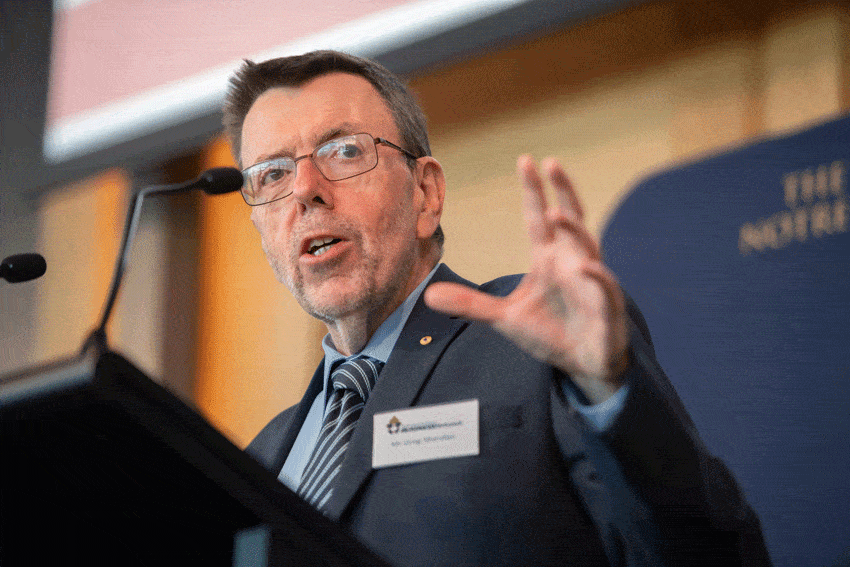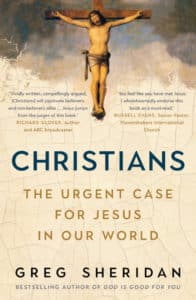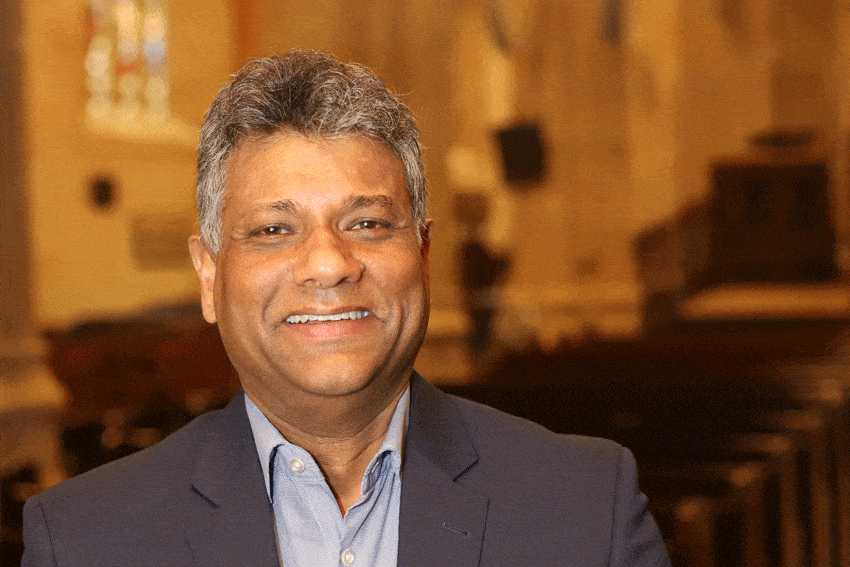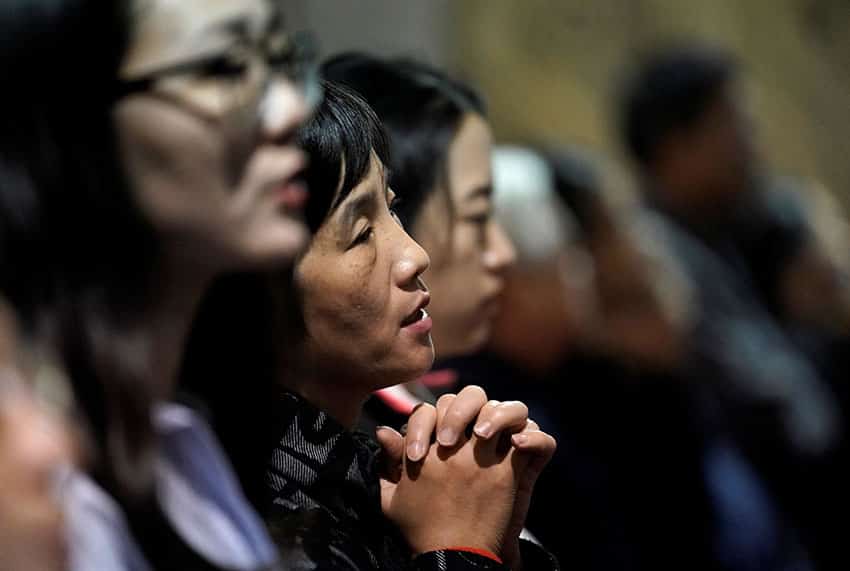
All the evidence around us points to the fact that Christianity is in decline in Australia.
Two generations ago, virtually every member of Australian society identified as being a member of a Christian denomination, a significant proportion of that population attended church services regularly, and most marriages were religious ceremonies.
By contrast, in the 2016 census, just over half the population identified as being Christian and most of the mainline churches have falling attendance rates. However, journalist Greg Sheridan, the Foreign Affairs editor for The Australian newspaper, demonstrates in his latest monograph Christians that Christianity is far from dead.
Furthermore, given its seminal influence on western thought and culture, Christianity deserves to be understood. Christians complements Sheridan’s earlier work God is Good for You (2018). The catalyst for Sheridan writing his most recent work was when someone complemented him on the previous work, but noted that there was little focus on the living Jesus therein.

Starting at the beginning
In the first section Sheridan explores the person of Jesus Christ in the New Testament writings, Mary and Paul, as well as the existence of angels.
In line with other contemporary writers such as John Dickson, he demonstrates that arguments that Jesus never existed that are propounded by elements of the ‘New Atheism’ are simply fallacious.
This is because the existence of Jesus of Nazareth is attested to by hostile Roman authors such as Tacitus.

Sheridan is also highly critical of liberal biblical criticism. Reading the Gospel accounts of Jesus as a journalist, Sheridan finds them to be reliable sources of information.
However, he notes that belief in the miracles and Jesus’ claims to be divine are matters of faith. He argues, in line with an emerging number of biblical scholars such as Richard Bauckham, that the events as recorded in the Gospels are eyewitness accounts, including John’s Gospel, and reflect what really happened. They are not the product of speculation and invention of Christian communities a couple of generations after Jesus.
Hence, he argues for an earlier rather than a later date for the composition of the Gospels.
In reading these, Sheridan argues it is evident that the early Christians believed Jesus was divine. Whilst this belief is more overt in John’s Gospel, it is reflected in the words and actions of Jesus in the Synoptic Gospels as well. Furthermore, Paul of Tarsus, some of whose writings are the earliest extant Christian works, clearly believed in the divinity of Christ.
In his discussion of Paul’s contribution to the emergence and spread of Christianity, Sheridan also challenges the current received belief amongst many biblical scholars that not all the letters attributed to Paul were written by him.
In arguing for Paul being the author of the Pauline corpus (with the exception of the Letter to the Hebrews), Sheridan notes that different writing styles do not of themselves prevent works from being written by the same person, noting that a writer’s style can mature and evolve.
He argues that Paul’s influence on the shape of Christian belief and his contribution to the spread of Christianity, through his journeyings, was seminal.

A power that’s real
As evidence of the power of the Gospels to change people’s lives, Sheridan cites the example of Kanishka Raffel, the Anglican Archbishop of Sydney.
Raised a Buddhist, a Christian friend asked him to read some Christian literature, and gave him Mark’s and John’s Gospels to read. In reading John’s Gospel, Kanishka became fascinated by Jesus.
One sleepless night, he read through it two and a half times. Jesus’ statement in Chapter 6 that nobody can come to the Father unless the Father sends them to Jesus, and that on the last day they would be raised up (cf John 6: 39, 40) struck a chord with Kanishka, and by the morning, he knew he was a Christian.
How Christians contribute
The second part of the work explores the influence of and contribution of Christians to society, beginning with a chapter entitled ‘Works inspired by Christian belief’.
Here, Sheridan notes that references to Christianity in popular culture a couple of generations ago were favourable, for example the depiction of the Reverend Mr Gruffydd in How Green Was My Valley (1941) and Catholicism in The Sound of Music (1966); by contrast, the few depictions of Christianity in contemporary popular culture are generally anti-Christian.
Nevertheless, Sheridan cites a few positive representations, for example the series Jane the Virgin (2014 – 2019) and the movie A Beautiful Day in the Neighbourhood (2019), the latter text having overt Christian themes, particularly that of forgiveness.
He also discusses the works of novelists Graham Greene, Evelyn Waugh and J R R Tolkien.
In the case of the latter, Sheridan is critical of the portrait of him in the movie Tolkien (2019) as there is hardly any reference to Tolkien’s Catholicism, which played a pivotal role in his life.
He also mentions the novel Gilead (2004) by Marilynne Robinson, which won the 2005 Pulitzer Prize, as well as the works of Piers Paul Read, a Catholic novelist, and Willa Cather, an Anglican, who wrote one of the great novels of the twentieth century Death Comes for the Archbishop (1927) about pioneer Catholic clergy in New Mexico. The particular strength of this chapter is the recommendations for reading and viewing that Sheridan makes.

Faith in action
In the next chapter, ‘Christians in Action’, Sheridan discusses the work of various people involved in volunteer projects, beginning with Gemma Sisia (nee Rice).
Raised a Catholic in rural New South Wales, she was inspired to go and teach in Africa for a year by a nun who had taught there. Eventually, she founded St Jude’s School in Tanzania, a school for girls of all faiths.
Funded largely by donations from Australian donors, the school provides educational opportunities to students who would otherwise not receive an education, and its graduates now include teachers and medical students about to graduate as doctors.
Later in the work, Sheridan profiles the work of Lyn Edge, the Salvation Army’s Secretary of Mission, and in so doing touches on the significant and positive contribution the Salvation Army makes to Australian society.
Waning – but waxing
Whilst Christianity may be on the wane in the western world, the same cannot be said for other parts of the world, namely Africa, where it is experiencing phenomenal growth, and China.
At the time of the Communist seizure of power in 1949, there were some 4 million Christians in China. Sheridan notes that it is hard to quantify how many Christians there are in China now; however, the conservative estimate is 60 million, with the high estimate placing the number at 120 million.
This is despite the fact that for much of the past 70 years, Christians have been subject to outright persecution. Furthermore, the Communist regime’s treatment of Christians is hardening.
Sheridan argues that is because although Chinese Christians do not have a political agenda the Communist party nevertheless regards Christianity as a threat because Christianity offers an alternative view of humanity and society to that offered by Communist ideology.
Sheridan attributes the growth of Christianity – notwithstanding the genuine possibility of sanctions – to the fact that Chinese people are looking for a sense of meaning, particularly given the significant upheavals and transformations in China, such as the migration of significant number of people from rural areas to cities.

A faith that renews itself
Despite the decline in Christianity in the western world, the Christian leaders whom Sheridan interviews for this work manifest a positive outlook.
In reading Sheridan’s surveys of Nicky Gumbel, an Anglican clergyman and the founder of the Alpha Course, through which numerous people have come to a belief in Christianity and/or a re-affirmation of their faith, Lyn Edge from the Salvation Army, and Peter Comensoli, the Catholic Archbishop of Melbourne, there is the sense that they are realistic about the challenges faced by Christians broadly, and their denomination in particular, yet are determined to make a positive contribution.
Interestingly, Gumbel does not see the decline of Christianity in western societies as inevitable, citing the amusing historical example of the state of Christianity in London in 1750.
Given the fact that in that year only 16 people attended a service on Easter Day, whereas in that year some 10,000 street walkers were active in the city, one could have easily believed that Christianity was at this point a spent force.
However, the Methodist revival beginning around the same period saw a phenomenal rebound of Christianity in Britain.

Something for everyone
Although the author is a Catholic, Sheridan deliberately writes the work to appeal to a broad spectrum of Christian believers in the tradition of CS Lewis.
Theologically, there is little that any mainline Christian denomination would disagree with, although some of his assessments may not go down well with many biblical scholars.
Sheridan deliberately avoids matters of belief that are contentious amongst Christians; for example, he acknowledges the debate between Catholics and Orthodox Christians on the one hand, and most Protestant denominations on the other on whether Jesus had siblings, not offering an opinion either way.
Given the positive reception of this work amongst people from a variety of Christian backgrounds, the author has succeeded in writing a book that resonates with a broad cross-section of believers.
This work would also engage non-Christian readers. The writer brings his experience as an investigative journalist and presents to readers a well-researched monologue that would engage most, a work that this reviewer found hard to put down. For this reason, it is a highly recommended work.
